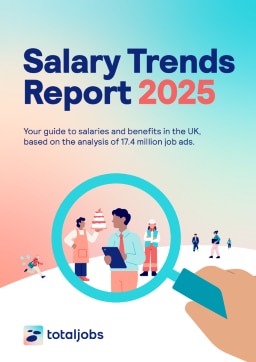
How to retain young talent in a competitive landscape
Table of Contents
- What young talent really wants
- Transparent pay and progression
- Offer growth opportunities
- Culture of openness around pay
- Understand under-30’s negotiation confidence
- Design benefits and flexibility
- Long-term engagement
- Retaining young talent

How to Attract and Retain Young Talent
Attracting young talent is only half the battle. Retaining them is where the real challenge begins.
Gen Z and younger millennials are reshaping the workforce with fresh expectations, higher salary awareness, and greater confidence in voicing their needs. Despite making up just 16% of the UK workforce, under-30s are one of the most mobile demographics. 44% plan to job hunt this year, with 1 in 3 seeking better pay and 1 in 4 prioritising work-life balance.
In this article, we’re looking at strategies employers and recruiters can employ to keep young people happy and engaged in the workplace.
1. Understand what young talent really wants
To retain young talent, it’s first crucial to understand what motivates them. Unsurprisingly, pay remains a key driver, with 1 in 3 young workers actively seeking higher salaries. However, it’s far from the only factor. Our research shows that:
- 24% want better growth and training opportunities
- 1 in 4 are seeking improved work-life balance
- 63% would accept lower pay for better benefits
- 41% would trade salary for a clear promotion path within 12–24 months
This group is values-driven, future-focused, and are driven by more than just salary. They’re seeking workplaces that invest in their development, respect their time, and treat them as active participants in their own career journey.
Key takeaway:
Retention starts with recognition. Young employees want to feel seen, heard, and supported, not just compensated.

Uncover what young professionals are looking for in the workplace
2. Prioritise transparent pay and progression
While salary undoubtedly plays a significant role in retention, it’s how you communicate pay, both internally and externally, that really matters to top talent. Our research shows that younger workers are confident and informed when it comes to compensation:
- 89% say they know how much they should be earning
- 73% feel comfortable negotiating salary
- 67% feel comfortable asking for a raise
As a result, pay transparency isn’t a nice-to-have, it’s a necessity for the attraction and retention of younger workers. And when salary discussions are avoided or vague, trust erodes quickly. In fact, 65% of under-30s say they avoid jobs that don’t include salary information upfront.
Key takeaway
Make salary information clear, and build in regular opportunities to discuss compensation, performance, and growth. This can start as early as the interview stage.

Ensure your compensation hits the mark with our Salary Trends Report
3. Offer growth opportunities employees can trust
A strong retention strategy, for any demographic, needs to answer one key question: “What’s next for me here?” This is especially important for Gen Z employees, as many young workers will leave a role if they can’t envision their next step with an employer. However, we found that 41% could be tempted to stay in their current role by a clearly defined promotion path, even if that means accepting a slightly lower salary. Remember, offering growth means more than just vague promises to employees. Wherever possible, it should include:
- Structured development plans
- Training budgets and resources
- Mentorship or peer learning opportunities
- Clear criteria for promotions and raises
It’s not just about promotion. It’s about progression. So, whether that’s expanding responsibilities, building new skills, or leading projects, growth must be visible and achievable for young talent.
Key takeaway
Career growth is one of the most powerful tools for retaining young talent, but it needs to be clearly mapped, regularly reviewed, and openly discussed.
4. Build a culture of openness around pay
One of the key takeaways of our research is that young employees aren’t afraid to talk about money. We found that:
- 71% of under-30s feel comfortable discussing salary with their peers
- 82% say conversations with colleagues help them estimate their value
These findings indicate a new level of salary transparency by default, even if employers aren’t going out of their way to offer it. That means internal equity, pay fairness, and performance-linked progression should be prioritised, as young talent will likely notice any gaps that emerge. Employers can lead this shift by:
- Conducting regular internal salary reviews
- Offering salary benchmarks to managers and employees
- Hosting Q&A sessions on compensation and benefits
- Training managers on having open, constructive pay conversations
Key takeaway
Even if employers dont want to talk about pay, employees will and draw their own conclusions as a result. Transparency can therefore protect an organisation’s reputation and strengthen trust.
5. Understand under-30’s negotiation confidence
We also found that when young workers negotiate their salary, they come prepared. During these conversations, under 30 are prepared to base their demands on:
- Confidence in their skills and experience (45%)
- Online salary research (36%)
- Concrete examples of achievements (34%)
- Past success negotiating a raise (26%)
- A strong job market for their role (25%)
Confidence in negotiating salary is generally higher in young men (42%) than young women (31%), but both are actively advocating for themselves. As a result, employers need to ensure they come prepared to negotiate when it comes to salary. Central to this is providing negotiation training or coaching for employees and managers to ensure they are equipped to succeed in these conversations.
Key takeaway
Young professionals not only believe they know what they are worth, they expect employers to recognise it too.
6. Design benefits and flexibility that match their priorities
While pay is important to young professionals, it’s not the only thing this demographic considers when it comes to their future careers. In fact, many are open to compromises if the wider compensation package aligns with their priorities. For example, we found that, aside from salary, the top priorities of workers under-30 include:
- Greater flexibility in working hours (44%)
- More paid time off (43%)
- Remote or hybrid working options (39%)
- Job security and employer stability (38%)
This generation values freedom, balance, and progression. As a result, employers that respond with rigid policies or one-size-fits-all benefits will likely struggle to retain their top performing young workers.
Key takeaway
If feasible, offer personalised flexibility, generous leave policies and tailored benefits, and make these offerings known as early as possible.
7. Work to create long-term engagement
Retention efforts start before an employee even joins an organisation, in the job advert, the interview, and in the offer letter. From the moment young talent encounters a brand, they’re assessing if it aligns with their values, goals, and expectations. Misalignment can lead to quick exits even after a successful hiring process. To build loyalty and foster engagement in the long-term, employers can:
- Share real examples of career paths in their organisation
- Provide onboarding that connects new hires with peers, mentors, and managers
- Set clear expectations around performance, feedback, and development
Key takeaway
First impressions matter. Early engagement should be meaningful, transparent, and future-focused to boost retention from the start.
Retaining young talent is a long-term strategy
The under-30 workforce is ambitious, informed, and ready to advocate for themselves. So, retaining young talent isn’t about gimmicks or ping-pong tables in the office. It’s about offering fair pay, transparent communication, real opportunities for growth, and a workplace that respects their needs and values.
Employers that lead with transparency, invest in development, and engage in meaningful dialogue around compensation will be the ones who are best equipped to both attract and retain the next generation of talent.

Download your free guide on winning the race for Gen-Z talent and mastering salary negotiations.
Learn how to:
- Close the gender pay gap by understanding measures you can take to negotiate fair compensation with younger employees
- Stand out to younger talent by adapting salaries in line with expectations and skills while staying within budget
- Sharpen your attraction and retention strategy with actionable steps to bolster your benefits packages
Explore articles
Receive the latest recruitment resources and
advice to boost your hiring
By providing us with your details you agree to our privacy policy and for us to keep you updated with the latest news, events,
and special offers from Totaljobs.






